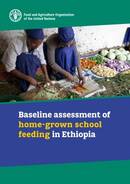出版物
This brief examines some of the key legal considerations related to school gardens, and also explores regulatory options for strengthening the legislative environment for sustainable school food and nutrition in the country. This brief is rooted in a holistic approach to school food and nutrition and the analysis provided in this note, is drawn from a legal assessment carried out within the framework of a wider project led by FAO, “Developing capacity for strengthening food security and nutrition in selected countries of the Caucasus and Central Asia”, funded by the Russian Federation.
School feeding programmes have been implemented in Ethiopia for 20 years. The scope of this report is to present the results of a 2019 baseline study of a HGSF programme implemented by the Government of Ethiopia.
The impact evaluation, whose results are presented in this publication, was designed to capture the impacts of the HGSF programme on farm production, food security and schooling. The evalutation is based on a post-test-only, non-equivalent control group design, and on two rounds of data collection: the first took place in June–July 2019 at the end of the school year, while the second was planned forthe same period in 2020, but did not materialize owing to the COVID-19 outbreak.
This report presents the results of a simulation analysis of different food procurement modalities employed by Senegal’s current school feeding programme (SFP) by using local economy-wide impact evaluation (LEWIE). The LEWIE methodology was designed to capture both the direct and the indirect impacts of a wide range of governmental programmes and policies in local economies. The findings suggest that SFPs in Senegal have significant positive impacts on production and income within a 10-km radius of beneficiary schools. These impacts grow as SFPs increase their sourcing from local traders and food producers.
Esta publicación, desarrollada en el marco del proyecto de alimentación escolar del Programa de Cooperación Internacional Brasil-FAO, tiene el objetivo de compartir algunas experiencias y el desarrollo del proceso de elaboración e implementación de marcos jurídicos y normativos en materia de alimentación escolar, e identificar algunos elementos fundamentales para su desarrollo. Está dirigida a parlamentarios, formuladores de políticas, actores de la comunidad escolar y aquellas personas y profesionales que tengan el interés, la voluntad e intención de elaborar un Proyecto de Ley a favor de la alimentación escolar. Se señalan caminos, avances y desafíos que enfrentan los diversos países de América Latina y el Caribe para el fortalecimiento, consolidación e institucionalización de sus programas de alimentación escolar, como una política pública fundamental en la garantía del derecho humano a la alimentación adecuada y saludable en el ámbito escolar.
校餐要营养均衡,还要满足所有学生的口味,这项任务相当艰巨,但重要性不言而喻。毕竟,为了孩子们的发展和健康成长,健康的膳食必不可少,与此同时,孩子们也应当能够享受这些健康的美食。





